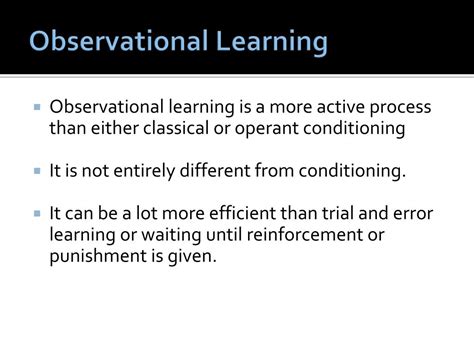Observational Learning: Definition And Noteworthy Examples

Have you ever learned something just by watching others? That’s the power of observational learning. It is a type of learning that occurs through observing and imitating the behaviors of others. From a young age, humans and animals alike have the ability to learn by simply watching those around them. In this article, we will explore the definition of observational learning and provide some noteworthy examples to help you understand its importance in our lives.
What is Observational Learning?
Observational learning, also known as social learning or modeling, is a type of learning that occurs when an individual observes the actions and behaviors of others and then imitates or adopts those behaviors. This learning process can take place directly, where the observer watches the model in real-time, or indirectly, where the observer learns from media or other forms of communication.
The Steps of Observational Learning
Observational learning typically involves four main steps:
- Attention: The observer must first pay attention to the model’s behavior. This can be influenced by factors such as the model’s attractiveness, the importance of the behavior, or the level of interest in the task.
- Retention: The observer must remember the behavior they have observed. This can be aided by mentally rehearsing or visualizing the behavior.
- Reproduction: The observer must be able to reproduce the behavior they have observed. This may involve physical or mental practice.
- Motivation: The observer must be motivated to imitate the behavior. This can be influenced by factors such as positive reinforcement, the perceived benefits of the behavior, or the social context.
Noteworthy Examples of Observational Learning
1. Albert Bandura’s Bobo Doll Experiment
In the 1960s, psychologist Albert Bandura conducted a series of experiments known as the Bobo doll experiments. In these experiments, children observed an adult model who either displayed aggressive or non-aggressive behavior towards a Bobo doll. Bandura found that children who observed the aggressive model were more likely to imitate the aggressive behavior themselves. This study provided strong evidence for the role of observational learning in shaping behavior.
2. Learning a New Language
When learning a new language, many people find it helpful to observe native speakers and imitate their pronunciation, intonation, and grammatical structures. By watching and listening to others, language learners can pick up on the nuances and subtleties of the language, making it easier for them to communicate effectively.
3. Cooking Shows
Have you ever watched a cooking show and then tried to recreate the recipe at home? Cooking shows are a great example of observational learning. By watching experienced chefs, viewers can learn new cooking techniques, ingredient combinations, and presentation styles. This form of learning has become increasingly popular with the rise of cooking shows and tutorials on platforms like YouTube.
4. Copying Fashion Trends
Observational learning is not limited to acquiring skills or knowledge. It can also be seen in the realm of fashion trends. Many people observe celebrities, influencers, or their peers and imitate their clothing choices, hairstyles, or makeup styles. This type of learning is driven by the desire to fit in, be fashionable, or express one’s identity through personal style.
Conclusion
Observational learning is a powerful tool that allows us to learn from the behaviors and experiences of others. It plays a significant role in our development and helps shape our thoughts, actions, and beliefs. By observing and imitating others, we can acquire new skills, gain knowledge, and navigate the complexities of the world around us.
Frequently Asked Questions
- Is observational learning only applicable to humans?
- Can observational learning be used to teach complex skills?
- What are the advantages of observational learning?
- Are there any limitations to observational learning?
- How can observational learning be utilized in educational settings?
- Can observational learning lead to negative outcomes?
- Is observational learning a form of imitation?
- Can observational learning occur without conscious awareness?
- Are there any ethical considerations related to observational learning research?
- How can observational learning be applied in everyday life?
